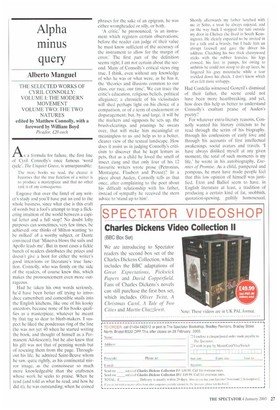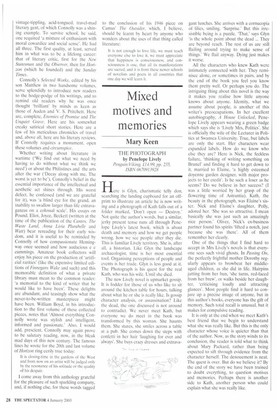Alpha minus query
Alberto Manguel
THE SELECTED WORKS OF CYRIL CONNOLLY: VOLUME I: THE MODERN MOVEMENT VOLUME TWO: THE TWO NATURES edited by Matthew Connolly, with a foreword by William Boyd Picador, 120 each As a formula for failure, the first line of Cyril Connolly's once famous 'word cycle', The Unquiet Grave, is unsurpassable:
The more hooks we read, the clearer it becomes that the true function of a writer is to produce a masterpiece and that no other task is of any consequence.
Engrave that over the lintel of any writer's study and you'll have put an end to the whole business, since what else is this craft of words hut a fool's attempt to trap a flickering intuition of the world between a capital letter and a full stop? No doubt lofty purposes can sometimes, very few times, be achieved: one thinks of Milton wanting 'to be milked' of a worthy subject, or Dante convinced that 'Minerva blows the sails and Apollo leads rue'. But in most cases a fickle bunch of readers distributes the prizes and doesn't give a hoot for either the writer's good intentions or literature's true function. Connolly, who was firmly on the side of the readers, of course knew this, which makes the pronouncement even more outrageous.
Had he taken his own words seriously, he'd have been better off trying to introduce camembert and comestible snails into the English kitchens, like one of his kooky ancestors, because none of his books qualifies as a masterpiece, whatever he meant by that tag so dear to blurb-makers. I suspect he liked the ponderous ring of the line (he was not yet 40 when he started writing the book, and thought of himself as a Permanent Adolescent), but he also knew that his gift was not that of penning words but of rescuing them from the page. Throughout his life, he admired Saint-Beuve whom he saw, quite rightly, as his continental mirror image, as the connoisseur so much more knowledgeable than the craftsmen whose work he seeks to praise. When he read (and told us what he read, and how he did it), he was outstanding; when he coined
phrases for the sake of an epigram, he was either wrongheaded or silly, or both.
'A critic,' he pronounced. Is an instrument which registers certain observations; before the reader can judge of their value he must know sufficient of the accuracy of the instrument to allow for the margin of error.' The first part of the definition seems right; I am not certain about the second. Many of Connolly's critical views ring true, I think, even without any knowledge of who he was or what were, as he has it, the 'theories and illusions common to our class, our race, our time'. We can trace the critic's education, religious beliefs, political allegiance; a chronicle of his vicissitudes will shed perhaps light on his choice of a comparison, or of a term of endearment or disparagement; but, by and large, it will be the markers and signposts he sets up, the brush-clearings and prunings he sweats over, that will make him meaningful or meaningless to us and help us to a better, clearer view of the textual landscape. How does it assist us in judging Connolly's criticism to discover that he kept lemurs as pets, that as a child he loved the smell of insect dung and that only four of his 12 favourite writers wrote prose (Petronius, Montaigne, Flaubert and Proust)? In a piece about Auden, Connolly tells us that once, after complaining to the poet about his difficult relationship with his father, instead of sympathy he received the stern advice to 'stand up to him'.
Shortly afterwards my father lunched with me in Soho, a treat he always enjoyed, and on the way back I stopped the taxi outside my door in Chelsea (he lived in South Kensington). He clearly expected to be invited in for a talk and a brandy, hut I bade him an abrupt farewell and gave the driver his address. Clutching his two thick cherrywood sticks with the rubber ferrules, his legs crossed, his feet in pumps, for owing to arthritis he could not stoop to do up laces, he fingered his grey moustache while a tear trickled down his cheek. I don't know which of us felt more unhappy.
Had Cordelia witnessed Goneril's dismissal of their father, the scene could not have been more heartbreaking, and yet, how does this help us better to understand Connolly's exultant praise of Auden's poetry?
For whatever extra-literary reasons, Connolly wanted his literary criticism to be read through the scrim of his biography, through his confessions of early love and through his accounts of first intellectual awakenings, social avatars and travels. have always disliked myself at any given moment; the total of such moments is my life,' he wrote in his autobiography, Enemies of Promise. As a child, pampered and pompous, he must have made people feel that this low opinion of himself was justified. Eton and Balliol seem to have, in English literature at least, a tradition of producing a certain kind of fat, snobbish, quotation-spewing, guiltily homosexual, vintage-tippling, acid-tongued, travel-mad literary gent, of which Connolly was a shining example. To survive school, he said, one required 'a mixture of enthusiasm with moral cowardice and social sense'. He had all three. The first quality, at least, served him in what was to be a lifelong career: that of literary critic, first for the New Statesman and the Observer, then for Horizon (which he founded) and the Sunday Times.
Connolly's Selected Works, edited by his son Matthew in two handsome volumes, serve splendidly to introduce new readers to the hodge-podge of his writings, and to remind old readers why he was once thought 'brilliant' by minds as keen as those of Auden and V. S. Pritchett. Here are, complete, Enemies of Promise and The Unquiet Grave. Here are his somewhat creaky satirical short stories. Here are a few of his meticulous chronicles of travel and, above all, here are his literary reviews. If Connolly requires a monument, open these volumes and circumspice.
Whether writing about literature in wartime (We find out what we need by having to do without what we think we need') or about the Philistines and the arts after the war ('Decay along with me, The worst is yet to he'), Connolly's belief in the essential importance of the intellectual and aesthetic act shines through. His worst defect, he confessed (and we are grateful for it), was 'a blind eye for the grand, an inability to swallow larger than life extravaganzas on a colossal scale'. His essays on Pound, Eliot, Joyce, Beckett (written at the time of the publication of the Cantos, The Waste Land, Anna Livia Plura belle and Watt) bear rereading for their early wisdom, and it is useful to be reminded by Connolly of how compassionate Hemingway once seemed and how audacious e e cummings. Amateur book collectors will enjoy his piece on the production of 'artificial rarities' (like the expensive limited editions of Finnegans Wake and such) and this memorable definition of what a private library must mean to the common reader: 'a memorial to the kind of writer that he would like to have been'. These delights are abundant, and teasingly show what the never-to-be-written masterpiece might have been. William Boyd, in his introduction to the first volume of these collected pieces, notes that 'Almost everything Connolly wrote was stylish and intelligent, informed and passionate.' Also. I would add, prescient. Connolly may again prove to be salutary reading, now, in the bleak mad days of this new century. The famous lines he wrote for the 20th and last volume of Horizon ring eerily true today:
It is closing-time in the gardens of the West and from now on an artist will he judged only by the resonance of his solitude or the quality of his despair.
I come away from this anthology grateful for the pleasure of such sparkling company, and, if nothing else, for these words tagged to the conclusion of his 1946 piece on Camus' The Outsider, which, I believe, should be learnt by heart by anyone who wonders about the uses of that thing called literature:
It is not enough to love life, we must teach everyone else to love it, we must appreciate that happiness is consciousness, and consciousness is one. that all its manifestations are sacred, and it is from these newer schools of novelists and poets in all countries that one day we will learn it.



















































 Previous page
Previous page